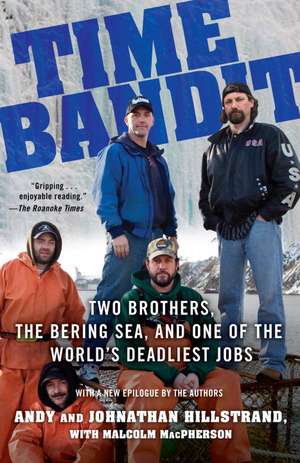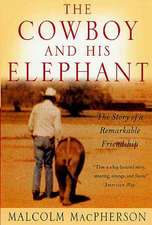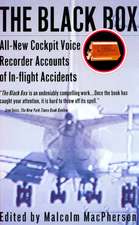Time Bandit: Two Brothers, the Bering Sea, and One of the World's Deadliest Jobs
Autor Johnathan Hillstrand, Andy Hillstrand, Malcolm Macphersonen Limba Engleză Paperback – 28 feb 2009
By turns raucous and reflective, exhilarating and anguished, enthralling, suspenseful, and wise, Time Bandit chronicles a larger-than-life love affair as old as civilization itself—a love affair between striving, willful man and inscrutable, enduring nature.
Preț: 94.88 lei
Nou
Puncte Express: 142
Preț estimativ în valută:
18.16€ • 19.41$ • 15.14£
18.16€ • 19.41$ • 15.14£
Carte disponibilă
Livrare economică 27 martie-10 aprilie
Preluare comenzi: 021 569.72.76
Specificații
ISBN-13: 9780345504128
ISBN-10: 0345504127
Pagini: 240
Ilustrații: 16-PAGE COLOR INSERT
Dimensiuni: 134 x 202 x 14 mm
Greutate: 0.2 kg
Editura: BALLANTINE BOOKS
ISBN-10: 0345504127
Pagini: 240
Ilustrații: 16-PAGE COLOR INSERT
Dimensiuni: 134 x 202 x 14 mm
Greutate: 0.2 kg
Editura: BALLANTINE BOOKS
Recenzii
“Gripping . . . enjoyable reading.”—Roanoke Times
“You know that cool reality-TV show Deadliest Catch? . . . The boat captains featured on the series . . . continue to scare us in this behind-the-scenes book.”—Sacramento Bee
“This boys’ own adventure is delivered with the irresistible bluster of a fisherman raving to a rescuer about how he has just cheated death . . . again!”—Sydney Morning Herald
“Their first-person accounts matter-of-factly explain what it’s like to constantly face death on the Bering Sea and what it does to your life back on land.”—Rochester Democrat and Chronicle
“You know that cool reality-TV show Deadliest Catch? . . . The boat captains featured on the series . . . continue to scare us in this behind-the-scenes book.”—Sacramento Bee
“This boys’ own adventure is delivered with the irresistible bluster of a fisherman raving to a rescuer about how he has just cheated death . . . again!”—Sydney Morning Herald
“Their first-person accounts matter-of-factly explain what it’s like to constantly face death on the Bering Sea and what it does to your life back on land.”—Rochester Democrat and Chronicle
Notă biografică
On board Time Bandit, their family owned and operated vessel, brothers Johnathan and Andy Hillstrand share the skippering duties. Johnathan, a resident of Homer, Alaska, takes the helm during the king crab season. When not on deck, chances are he can be found on the back of his Harley Fat Boy. During opilio season it is Andy who sits in the wheelhouse. In the off-season, however, he can be found training horses on his ranch in Indiana.
Malcolm MacPherson is a former correspondent for Newsweek and the author of more a dozen books including most recently the satirical war novel Hocus Potus and the nonfiction account of battle in Afghanistan, Roberts Ridge. He lives near the Blue Ridge Mountains in Virginia with his wife and children.
Malcolm MacPherson is a former correspondent for Newsweek and the author of more a dozen books including most recently the satirical war novel Hocus Potus and the nonfiction account of battle in Afghanistan, Roberts Ridge. He lives near the Blue Ridge Mountains in Virginia with his wife and children.
Extras
Chapter One
I Live like a King
- Johnathan
I am a fisherman, an Alaskan fisherman, and a Bering Sea crab fisherman with thirty-seven years on commercial boats. I am tagged as a “bad boy of the Bering Sea” in “the deadliest profession in America.” I have fought forty-foot seas and seen rogue waves one hundred feet high. I work on water cold enough to kill a man in five minutes, and I have bent under the power of 120-knot Williwaw winds and watched the crushing strength of the Arctic ice pack move south from Russia around the hull of my boat, Time Bandit. I am Johnathan Hillstrand and that is where I stand in the universe.
Right now, that might be another man’s life, because I am drifting in a small boat without power, alone, and with no help in sight. Waves no taller than my forearm lap the hull with a rhythm that makes me want to dream. Nothing here threatens me. The sky is a washed-out blue without a cloud to the horizon in every direction.
It’s creeping me out.
The boat I am on, a thirty-eight-foot Weggley gill-netter I named fishing vessel (F/V) Fishing Fever, bobs with the tide in full ebb at about four knots. The boat and I are captives of a moon that pulls us southwestward. I am, I can only estimate, fifty to sixty miles southwest of the mouth of the Kasilof River where I started this morning. I have about ten dozen fat, fresh, Cook Inlet, red sockeye salmon on ice in my tanks. I care where the tide is drifting me (not just because going where I do not want to go is an inconvenience); I would prefer to be back at fishing camp by nightfall with my buddies in the junkyard behind the Kasilof cannery with a bottle of Crown Royal in one hand and a hot dog in the other, telling stories around an oil-drum fire. Almost certainly, that will not happen.
I started drifting when Fishing Fever’s engine blew up more than three hours ago. The reduction gear fried with a grunt, and the boat shuddered and died like it had been sapped. The demise did not come as a complete surprise. The boat’s former owner never changed the oil, and the engine was flooded twice. I bought the boat four years ago because I liked the shape of its hull, not the thrum of its engine. The blame is also mine. I had gunned the engine at stressful rpms back and forth along the hundred-yard length of the gill net in an attempt to herd the spawning salmon toward the mesh. I cannot make repairs to the reduction gear until I can get back to Kasilof, lay the boat on the mud, and get a mechanic in the tiny engine compartment with wrenches. I opened up the cover and squeezed myself—I am 6’ 1” and weigh 205 pounds—behind the drive shaft for a look. The shaft is not spinning, and clear oil leaks in the reduction gear when I turn the engine off. Murphy’s Law works on water as well as on land. My batteries are not charging. I am leaking power slowly. With batteries fading, no motor, no radios, I am, in a word, fucked.
I shut the cover, wishing I could forget what I saw.
The tide is drifting me faster than I like in the direction of Augustine Island and beyond, into the Shelikof Strait, where anything can happen, and sometimes does. In his ship’s log, Captain Cook supposedly wrote that the second worst weather and currents on earth, after Cape Horn, can be found in the Strait. Like the Bering Sea where my brother and I fish, storms come up in the Strait with startling speed and a violence that can turn a pond into a maelstrom in six hours, and often less. The winds whip off the icy fjord walls that overlook the Strait; currents from the Kennedy Entrance compete with currents from the Cook Inlet, Kachemak Bay, the Gulf of Alaska, and several tidal rips. Put together, these produce swells like nowhere else in Alaska. I look at my watch. As we say, shit happens when you party naked.
It was not long ago that I was caught in the Strait. It was blowing eighty. I looked out and shouted into an indifferent and wild wind. I was coming in to shelter in a cove when I saw a man on the water in what looked like a canoe. He was waving a red coat. I did not believe my eyes. My deckhand and friend, Codfish Tom, woke up and looked to verify the sight. Codfish is a big dude with a head big enough to have its own gravity, its own atmosphere, its own weather system. I asked him, “Do you see that, Codfish?”
He said, “It doesn’t make sense.”
Three guys were sitting on the bottom of a boat no bigger than Fishing Fever; the storm had capsized their craft with only the bow sticking out. The men were dying slowly of hypothermia, bleeding out body warmth twenty-four times faster than they would in air the same temperature as the water. A bitter cold was reaching its icy fingers into the core of their hearts. They had no survival suits. I jumped into the water in my survival suit to save them. They had no strength when I reached them. One of them sank. He just gave up and headed to the bottom. I grabbed him by the hair and pulled him up for breath. One by one I brought them onboard my boat and gave them hot coffee and cigarettes and dry clothes. I quickly flipped through the pages in a book for advice on treating hypothermia, where I learned that under no circumstances was I to give them coffee or cigarettes. I smacked the smokes out of their mouths. One guy could not talk he was so cold. I kept asking him, “What’s your name? Tell me your name.” to keep him alive. The man I pulled out by the hair later tattooed the name of my boat on his arm: Arctic Nomad.
We sheltered in that cove, with them aboard, until the storm subsided. There was nothing else we could do.
So I know the weather in the Strait. I know about the cold and what Alaskan waters can do. The Coast Guard does not mandate 406/121.5 MHZ EPIRBs, an Emergency Position Indicating Radio Beacon, on boats the size of Fishing Fever. EPIRBs automatically beam a Mayday and identifying signal and location to a satellite and down to the Coast Guard in Juneau. Without an EPIRB, I might as well not exist in a crisis. Not that the Coast Guard would tow me in if they knew, unless I was about to go under; maritime law assigns liability for a broken boat to the boat that tows her in, and the Coast Guard, while a reassuring presence, does not view itself as AAA.
Making matters worse, Fishing Fever does not carry a single sideband radio; no other boat in the Cook Inlet red salmon fleet does either. My VHF went screwy when the engine quit; I have been losing batteries all morning (and besides, VHF channel 16 reaches only about 20 miles). My Razr cell phone could not find a signal this far out in the bland wilderness of the sea even if I had not thrown it on the oil-drum fire last night. By the time I fished it out of the flames it looked like a s’more. At least as far as technology goes, I would be better off right now in the era of James Cook with sail, sextant, and pennant signal flags.
I stayed up last night getting drunk. I stopped counting at eighteen double shots. There is too much Crown Royal in this world and not enough willpower. I was out of control. At the camp, my fellow drift netters and I decided to fish the next day according to where we threw magnetic darts at a silhouette of a naked woman we had drawn on the side of a broken-down white van. I hit the lower regions, which put me down on the south line for the opening. With that much decided, we talked about what we talk about at fishing camp—fishing, boats, gadgets, and women, in that order. We did not get to the topic of women before the Crown Royal got to me. The last thing I remember, I was telling my buddies about the time my brother Andy and I were fishing for red king crabs in Bristol Bay. We were trying an experiment with a TV camera that we had contained in a watertight box that we were towing underwater to help us locate crabs, which roll along the sea floor in balls fifteen feet high. Sometimes they migrate as many as four miles in a day. Andy and I were staring into the TV monitor when suddenly a human arm floated by wearing the orange sleeve of a seaman’s rain slicker, with a blue rubber glove on its hand. Where the rest of the body went, who could say?
“Did you see that?” I asked Andy.
He said, “I saw it. Did you see it?”
We started to laugh—a psychotic, not a funny, laugh. Just then, at that exact moment, we felt a bump against the hull. We told each other it might be the rest of the guy looking for his arm. But we had only bumped into a humpback whale, and he was mad as hell. On the surface, he glared at us with a huge eyeball that seemed to be telling us, “Next time watch where you’re going, Bub.”
Last night, I staggered from the fishing camp to the river, took a skiff out to Fishing Fever, tied to a buoy in the channel—around midnight, as I recall—and slept on the bunk in the back of the wheelhouse until three this morning when I cast off the buoy. Fishing was set to open at seven and would close twelve hours later. I did not want to be a minute late. My friends from camp followed me out through the darkness into the Inlet. At this moment, while I drift, they are netting their catch somewhere out of sight to the northeast of me.
To me, gillnetting salmon is fishing. I hate to miss a minute of the fun. I fish for red king and opilio crabs in winter to help pay for salmon netting in summer. I never can seem to make money off salmon. I do not know why. And I really do not care. I love the camp, the guys, the fish, and the fishing. To me the pleasures are worth breaking even. Sockeye salmon are the most beautiful fish in the world. They are the first to come upriver and are the biggest and nicest. This year I will get $1.10 a pound for them. But that is not what draws me out on the water year after year. The ritual of catching them reminds me of the old ways: One man, one boat, and one sea. Unlike crab fishing on the Bering Sea, with salmon netting there are no hydraulic booms, pot launchers, 800-pound pots, or coilers, no deck crew and pot blocks. The process, blissful for its simplicity, has not changed for a century.
Once out where the salmon are rushing in from the sea, I watch the surface of the water for jumpers. Salmon grow excited near the mouth of the river where they were born. After years at sea they know they are fast approaching the end of their life’s amazing journey. They come toward the land in schools of hundreds and thousands, dodging men like me who are out to stop them. The ones nearest the surface jump and slap the water with their tails, I like to think, in celebration of the closing circle of their lives. They are going to die soon but in dying in the fresh waters where they were born they are renewing life, and I like to think that this renewal gives them profound joy.
I watch their direction, race my boat ahead, roll the net off the reel, and wait for them to hit. The net by law can be no more than thirty-two feet deep. If a salmon is large, it cannot enter the webbing, and if small, it swims cleanly through. The right size fish is trapped and cannot back out without snagging its gills. The trick for me is to get them onto the boat quickly, before the screaming gulls pluck out their eyes and the seals bite chunks out of their blood-red flesh. And if they are not bled soon, their blood spoils and alters the flavor of their flesh.
As fast as I can, I turn the reel, pick the fish out of the net, and turn some more until the net is wound around, and the fish are flapping at my ankles. In the sun their skin shines silver with shadows of black and shades of gray. They are two to three feet long, sleek and firm, brimming with healthy wild life. They are what God meant fish to be, the king of fish and not just because English kings used to be the only ones allowed to fish them. They bestow a grace on me. I live like a king, I believe, thanks to the blessings of wild salmon.
It looks like I may be filleting one from the hold for lunch. But for now, I enter the cabin from the deck and stretch out on the bunk in the wheelhouse, cushioned by a sleeping bag, with a pillow under my head, with nothing to do but wait and think and reminisce. The time will not be wasted.
In another two months, my brother Andy and I will start our twenty-eighth continuous season crabbing on the Bering Sea. Since I ended the 2006–2007 crab season last March, I have not taken stock of all that happened to me. In its broadest outlines, last year was by far the wildest, most bizarre, stressful, and joyous of my life. Fateful forces aligned to both greet and bushwhack me. There were storms in my stars. I put a man in a coma for three days with my fists and feet—and nearly killed him—over the honor of a woman. I spent Christmas and New Year’s in jail facing a maximum sentence of ten years. Somewhere along the line a complete stranger told me she had never seen so many angels as she saw over my head—and she swore she could see them her whole life. On the Bering Sea, my brother Andy and I plugged Time Bandit’s tanks with red king crab and opilio. I saved a man’s life by plucking him from the icy clutches of the Bering Sea. The Arctic ice pack off the Pribilof Islands nearly crushed the steel hull of Time Bandit, with me in command.
I Live like a King
- Johnathan
I am a fisherman, an Alaskan fisherman, and a Bering Sea crab fisherman with thirty-seven years on commercial boats. I am tagged as a “bad boy of the Bering Sea” in “the deadliest profession in America.” I have fought forty-foot seas and seen rogue waves one hundred feet high. I work on water cold enough to kill a man in five minutes, and I have bent under the power of 120-knot Williwaw winds and watched the crushing strength of the Arctic ice pack move south from Russia around the hull of my boat, Time Bandit. I am Johnathan Hillstrand and that is where I stand in the universe.
Right now, that might be another man’s life, because I am drifting in a small boat without power, alone, and with no help in sight. Waves no taller than my forearm lap the hull with a rhythm that makes me want to dream. Nothing here threatens me. The sky is a washed-out blue without a cloud to the horizon in every direction.
It’s creeping me out.
The boat I am on, a thirty-eight-foot Weggley gill-netter I named fishing vessel (F/V) Fishing Fever, bobs with the tide in full ebb at about four knots. The boat and I are captives of a moon that pulls us southwestward. I am, I can only estimate, fifty to sixty miles southwest of the mouth of the Kasilof River where I started this morning. I have about ten dozen fat, fresh, Cook Inlet, red sockeye salmon on ice in my tanks. I care where the tide is drifting me (not just because going where I do not want to go is an inconvenience); I would prefer to be back at fishing camp by nightfall with my buddies in the junkyard behind the Kasilof cannery with a bottle of Crown Royal in one hand and a hot dog in the other, telling stories around an oil-drum fire. Almost certainly, that will not happen.
I started drifting when Fishing Fever’s engine blew up more than three hours ago. The reduction gear fried with a grunt, and the boat shuddered and died like it had been sapped. The demise did not come as a complete surprise. The boat’s former owner never changed the oil, and the engine was flooded twice. I bought the boat four years ago because I liked the shape of its hull, not the thrum of its engine. The blame is also mine. I had gunned the engine at stressful rpms back and forth along the hundred-yard length of the gill net in an attempt to herd the spawning salmon toward the mesh. I cannot make repairs to the reduction gear until I can get back to Kasilof, lay the boat on the mud, and get a mechanic in the tiny engine compartment with wrenches. I opened up the cover and squeezed myself—I am 6’ 1” and weigh 205 pounds—behind the drive shaft for a look. The shaft is not spinning, and clear oil leaks in the reduction gear when I turn the engine off. Murphy’s Law works on water as well as on land. My batteries are not charging. I am leaking power slowly. With batteries fading, no motor, no radios, I am, in a word, fucked.
I shut the cover, wishing I could forget what I saw.
The tide is drifting me faster than I like in the direction of Augustine Island and beyond, into the Shelikof Strait, where anything can happen, and sometimes does. In his ship’s log, Captain Cook supposedly wrote that the second worst weather and currents on earth, after Cape Horn, can be found in the Strait. Like the Bering Sea where my brother and I fish, storms come up in the Strait with startling speed and a violence that can turn a pond into a maelstrom in six hours, and often less. The winds whip off the icy fjord walls that overlook the Strait; currents from the Kennedy Entrance compete with currents from the Cook Inlet, Kachemak Bay, the Gulf of Alaska, and several tidal rips. Put together, these produce swells like nowhere else in Alaska. I look at my watch. As we say, shit happens when you party naked.
It was not long ago that I was caught in the Strait. It was blowing eighty. I looked out and shouted into an indifferent and wild wind. I was coming in to shelter in a cove when I saw a man on the water in what looked like a canoe. He was waving a red coat. I did not believe my eyes. My deckhand and friend, Codfish Tom, woke up and looked to verify the sight. Codfish is a big dude with a head big enough to have its own gravity, its own atmosphere, its own weather system. I asked him, “Do you see that, Codfish?”
He said, “It doesn’t make sense.”
Three guys were sitting on the bottom of a boat no bigger than Fishing Fever; the storm had capsized their craft with only the bow sticking out. The men were dying slowly of hypothermia, bleeding out body warmth twenty-four times faster than they would in air the same temperature as the water. A bitter cold was reaching its icy fingers into the core of their hearts. They had no survival suits. I jumped into the water in my survival suit to save them. They had no strength when I reached them. One of them sank. He just gave up and headed to the bottom. I grabbed him by the hair and pulled him up for breath. One by one I brought them onboard my boat and gave them hot coffee and cigarettes and dry clothes. I quickly flipped through the pages in a book for advice on treating hypothermia, where I learned that under no circumstances was I to give them coffee or cigarettes. I smacked the smokes out of their mouths. One guy could not talk he was so cold. I kept asking him, “What’s your name? Tell me your name.” to keep him alive. The man I pulled out by the hair later tattooed the name of my boat on his arm: Arctic Nomad.
We sheltered in that cove, with them aboard, until the storm subsided. There was nothing else we could do.
So I know the weather in the Strait. I know about the cold and what Alaskan waters can do. The Coast Guard does not mandate 406/121.5 MHZ EPIRBs, an Emergency Position Indicating Radio Beacon, on boats the size of Fishing Fever. EPIRBs automatically beam a Mayday and identifying signal and location to a satellite and down to the Coast Guard in Juneau. Without an EPIRB, I might as well not exist in a crisis. Not that the Coast Guard would tow me in if they knew, unless I was about to go under; maritime law assigns liability for a broken boat to the boat that tows her in, and the Coast Guard, while a reassuring presence, does not view itself as AAA.
Making matters worse, Fishing Fever does not carry a single sideband radio; no other boat in the Cook Inlet red salmon fleet does either. My VHF went screwy when the engine quit; I have been losing batteries all morning (and besides, VHF channel 16 reaches only about 20 miles). My Razr cell phone could not find a signal this far out in the bland wilderness of the sea even if I had not thrown it on the oil-drum fire last night. By the time I fished it out of the flames it looked like a s’more. At least as far as technology goes, I would be better off right now in the era of James Cook with sail, sextant, and pennant signal flags.
I stayed up last night getting drunk. I stopped counting at eighteen double shots. There is too much Crown Royal in this world and not enough willpower. I was out of control. At the camp, my fellow drift netters and I decided to fish the next day according to where we threw magnetic darts at a silhouette of a naked woman we had drawn on the side of a broken-down white van. I hit the lower regions, which put me down on the south line for the opening. With that much decided, we talked about what we talk about at fishing camp—fishing, boats, gadgets, and women, in that order. We did not get to the topic of women before the Crown Royal got to me. The last thing I remember, I was telling my buddies about the time my brother Andy and I were fishing for red king crabs in Bristol Bay. We were trying an experiment with a TV camera that we had contained in a watertight box that we were towing underwater to help us locate crabs, which roll along the sea floor in balls fifteen feet high. Sometimes they migrate as many as four miles in a day. Andy and I were staring into the TV monitor when suddenly a human arm floated by wearing the orange sleeve of a seaman’s rain slicker, with a blue rubber glove on its hand. Where the rest of the body went, who could say?
“Did you see that?” I asked Andy.
He said, “I saw it. Did you see it?”
We started to laugh—a psychotic, not a funny, laugh. Just then, at that exact moment, we felt a bump against the hull. We told each other it might be the rest of the guy looking for his arm. But we had only bumped into a humpback whale, and he was mad as hell. On the surface, he glared at us with a huge eyeball that seemed to be telling us, “Next time watch where you’re going, Bub.”
Last night, I staggered from the fishing camp to the river, took a skiff out to Fishing Fever, tied to a buoy in the channel—around midnight, as I recall—and slept on the bunk in the back of the wheelhouse until three this morning when I cast off the buoy. Fishing was set to open at seven and would close twelve hours later. I did not want to be a minute late. My friends from camp followed me out through the darkness into the Inlet. At this moment, while I drift, they are netting their catch somewhere out of sight to the northeast of me.
To me, gillnetting salmon is fishing. I hate to miss a minute of the fun. I fish for red king and opilio crabs in winter to help pay for salmon netting in summer. I never can seem to make money off salmon. I do not know why. And I really do not care. I love the camp, the guys, the fish, and the fishing. To me the pleasures are worth breaking even. Sockeye salmon are the most beautiful fish in the world. They are the first to come upriver and are the biggest and nicest. This year I will get $1.10 a pound for them. But that is not what draws me out on the water year after year. The ritual of catching them reminds me of the old ways: One man, one boat, and one sea. Unlike crab fishing on the Bering Sea, with salmon netting there are no hydraulic booms, pot launchers, 800-pound pots, or coilers, no deck crew and pot blocks. The process, blissful for its simplicity, has not changed for a century.
Once out where the salmon are rushing in from the sea, I watch the surface of the water for jumpers. Salmon grow excited near the mouth of the river where they were born. After years at sea they know they are fast approaching the end of their life’s amazing journey. They come toward the land in schools of hundreds and thousands, dodging men like me who are out to stop them. The ones nearest the surface jump and slap the water with their tails, I like to think, in celebration of the closing circle of their lives. They are going to die soon but in dying in the fresh waters where they were born they are renewing life, and I like to think that this renewal gives them profound joy.
I watch their direction, race my boat ahead, roll the net off the reel, and wait for them to hit. The net by law can be no more than thirty-two feet deep. If a salmon is large, it cannot enter the webbing, and if small, it swims cleanly through. The right size fish is trapped and cannot back out without snagging its gills. The trick for me is to get them onto the boat quickly, before the screaming gulls pluck out their eyes and the seals bite chunks out of their blood-red flesh. And if they are not bled soon, their blood spoils and alters the flavor of their flesh.
As fast as I can, I turn the reel, pick the fish out of the net, and turn some more until the net is wound around, and the fish are flapping at my ankles. In the sun their skin shines silver with shadows of black and shades of gray. They are two to three feet long, sleek and firm, brimming with healthy wild life. They are what God meant fish to be, the king of fish and not just because English kings used to be the only ones allowed to fish them. They bestow a grace on me. I live like a king, I believe, thanks to the blessings of wild salmon.
It looks like I may be filleting one from the hold for lunch. But for now, I enter the cabin from the deck and stretch out on the bunk in the wheelhouse, cushioned by a sleeping bag, with a pillow under my head, with nothing to do but wait and think and reminisce. The time will not be wasted.
In another two months, my brother Andy and I will start our twenty-eighth continuous season crabbing on the Bering Sea. Since I ended the 2006–2007 crab season last March, I have not taken stock of all that happened to me. In its broadest outlines, last year was by far the wildest, most bizarre, stressful, and joyous of my life. Fateful forces aligned to both greet and bushwhack me. There were storms in my stars. I put a man in a coma for three days with my fists and feet—and nearly killed him—over the honor of a woman. I spent Christmas and New Year’s in jail facing a maximum sentence of ten years. Somewhere along the line a complete stranger told me she had never seen so many angels as she saw over my head—and she swore she could see them her whole life. On the Bering Sea, my brother Andy and I plugged Time Bandit’s tanks with red king crab and opilio. I saved a man’s life by plucking him from the icy clutches of the Bering Sea. The Arctic ice pack off the Pribilof Islands nearly crushed the steel hull of Time Bandit, with me in command.


















